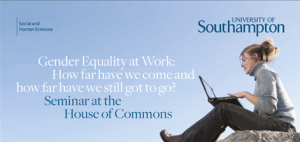storify by Roxanne Persaud
Tag Archives: PublicPolicy@Southampton
Pushing forward on gender equality at the House of Commons
The Work Futures Research Centre was delighted to celebrate the eve of International Women’s Day with a panel discussion on ‘Gender Equality at Work: how far have we come and how far have we still got to go?’, held in the Palmerstone Committee room at the Palace of Westminster, London.
This event marked the start of a new Public Policy@Southampton commission which will bring together the views of academics, policy makers, practitioners, employers and employees to consider how policy might make a difference to gender equality at work.
Professor Pauline Leonard opened the event with a brief overview of some of the key legislative, cultural and economic shifts in gendered aspects of work over the past 40 years. Professor Susan Halford then introduced our distinguished speakers: we began with a view from the top – courtesy of Lynne Berry OBE, deputy chair of the Canal and River Trust, who explored why women are so poorly represented on the executive boards of major companies. She spoke of ambitious targets for greater representation of women on company Boards, noting that while women have a bit more of a foothold in the voluntary and charitable sector they are still not taken seriously in FTSE 100 or FTS 250 companies. If we have a way to go at Board level, the picture was equally depressing when our next speaker Alan Whitehead MP reminded us that there had been under 400 women MPs since they first entered the House in 1918 (currently there are 146 women and 504 male MPs). Alan alerted us to the 32 men pictured in the splendid artwork adorning the committee room walls and the absence of a single female portrait; he suggested that without serious changes to selection and election processes this male dominance of the political sphere would continue.
Next, Samantha Mangwana, from Slater and Gordon Lawyers, spoke from the heart about the civil law cases she represents giving us anonymised, but extremely grim, accounts of the kinds of workplace harassment and sexual discrimination which women experience. In passing she mentioned that 1 in 7 women lose their jobs after maternity leave. Evangelia Bourmpoula from International Labour Organisation provided a wide ranging economists view of the global position of women in labour market using a wealth of research to demonstrate the continued vulnerability of working women in most of the world. We then returned to the UK context with our final speaker Helen Sachdev, a Director at Barclays, who described some of the very positive training and development programmes this bank has introduced to support and develop its women employees. She also gave a reflexive personal view of how gender discrimination had changed in her own working life – she felt that there was much to be positive about because women were less subject to overt and aggressive forms of discrimination, but that unconscious bias still persisted and could hold women back.
That may seem on the whole a fairly negative appraisal of how far we have come – yet the panel was inspirational and uplifting, not least because all the participants spoke passionately about how they overcame discrimination and used their work and experience to challenge gender inequality. Together the panel (and the lively contributions from the audience) provided a welcome and positive start to the work of the Policy Commission. We hope to report more here as this work continues but in the meantime want to acknowledge the fantastic start to the debate given by our splendid panel.
Further work on this commission will be continued, providing an evidence based Policy Briefing with a view to changing public policy in this area. Podcasts of the event will soon be available at http://publicpolicy.southampton.ac.uk/
Please visit the Work Futures Research Centre website for further news about the centre’s research at: http://www.southampton.ac.uk/wfrc/
Follow us on twitter @WorkFutures
Gender Equality at Work: How far have we come and how far have we still got to go?
You are invited to a symposium to debate the current state of play for Gender Equality at Work
Thursday 7 March 2013 | 2.00pm–4.00pm | Thatcher Room, Portcullis House, Westminster.
This event in celebration of International Women’s Day will bring together an important and inspiring range of speakers: policy makers, practitioners and academics, to debate the current state of play for Gender Equality at Work, and to consider where and how policy interventions might make a difference.
An Introduction by Professor Susan Halford and Professor Pauline Leonard of the Faculty of Social and Human Sciences, University of Southampton will be followed by a Panel Discussion with Alan Whitehead (Labour MP for Southampton Test), Baroness Margaret Prosser (Deputy Chair of the Equality and Human Rights Commission), Samantha Mangwana (Principal Lawyer for Slater & Gordon Lawyers), Evangelia Bourmpoula (Economist for the International Labour Organisation), Helen Sachdev (Director of UK Strategy, Retail and Business Banking at Barclays Bank) and Lynne Berry OBE (Deputy Chair of the Canal and River Trust and Director of Public Benefit). The floor will be opened up to questions from the audience afterwards and there will be a summary of the debate.
RSVP at http://publicpolicy.southampton.ac.uk/genderequality by 28 February 2013
This event is kindly supported by Public Policy@Southampton, C2G2, Work Futures Research Centre and Multidisciplinary Research at Southampton.
![]() Follow us on twitter: @workfutures @publicpolicyUoS @c2g2soton
Follow us on twitter: @workfutures @publicpolicyUoS @c2g2soton
#WFRC #GenderEqualityUoS #IWD
